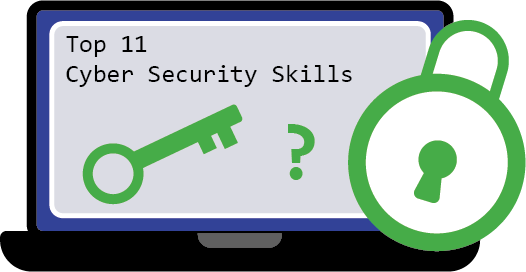Top 11 Cybersecurity Skills You Must Have in 2023 (High Demand)


Cybersecurity is one of the hottest industries right now.
With around 3.5 million jobs to be filled and increasing demand for professionals, it’s one of the most secure professions in the world.
No matter where you look for work and which cyber security training courses you’re interested in, there’s a high chance you’ll see job offers start pouring in as soon as you apply.
In the past, cyber security has been a career where most professionals are self-trained.
However, as more businesses turn to cloud storage and aim to protect their data, they’re looking for trained and skilled workers to take up the position, not just some self-starting computer nerd.
If you want to start a successful career in cyber security, then there are a few skills that you absolutely must have and certain job requirements you need to meet.
#1. Understand networking and system administration
Even if you don’t plan on working primarily in networking and system administration, you’ll need to know your way around in order to start your career.
Many entry-level cyber security jobs revolve around system administration and networking, so having a decent understanding of both will help you start off on the right foot.
Once you start climbing your way up the ladder and take on jobs that have less to do with system administration and networking, these skills can still come into play.
You never know where a security problem may arise from, so being able to navigate through these two areas of cyber security and identify problems will be a great boost to your career.
#2. Perform risk assessments
Risk assessment is a very basic cyber security skill, but it’s important nonetheless.
With proper risk assessment, you can identify most vulnerabilities within a system before a hacker takes advantage of them.
It’s the best way to provide preventative security measures and remain proactive about protecting information.
#3. Learn Linux server administration
Linux is one of the most commonly used servers in cyber security because it is one of the least vulnerable to malware attacks.
It’s also an open-source server that is completely free.
The source code is modifiable, it’s easy to install on multiple devices, and it is very versatile.
In order to work in cyber security, you’ll need to learn and master Linux server administration.
You must be confident and able to navigate the Linux server before you can even begin your career.
In some cases, you may even be required to understand and use Kali Linux, a Linux-based penetration tester, and digital forensics.
#4. Logical reasoning and troubleshooting abilities
There are many technical skills that you absolutely must know in order to do your job as a cybersecurity professional, but soft skills are just as important.
Two of the most important soft skills for cyber security professionals include logical reasoning and troubleshooting.
With the ability to troubleshoot problems, you’ll be quicker at identifying issues and resolving them.
When used in combination with logical reasoning, you’ll be capable of fixing both major and minor cybersecurity issues in a shorter amount of time.
Rather than sit and struggle to find the problem, you’ll be proactive in uncovering it and be able to work quicker and more efficiently.
#5. Know how to perform penetration testing
Along with risk assessments, penetration testing is vital in identifying vulnerabilities and working to protect a system from attacks.
Whether you want to work as an ethical hacker or you just want to cover the cyber security basics, penetration testing is a non-negotiable skill you must demonstrate.
Penetration testing is exactly what it sounds like.
You attempt to hack or penetrate a business’s system or network in order to fix weaknesses that real hackers might exploit.
The results of penetration testing will provide you and other cyber security professionals with a clear picture of what aspects of the system security needs to be updated and where it’s already strong.
Over time, weaknesses and strengths will change, which means that penetration testing isn’t a one-and-done thing.
It needs to be done routinely and with each system update so that you don’t accidentally expose a business to hackers or overlook a weakness that is easy to get past.
#6. Have a handle on all types of security
Cybersecurity is a career that’s all-encompassing.
It isn’t just internet security. As a cyber security professional, you’ll need to be skilled at cloud security, blockchain security, and application development security.

Cloud security
More businesses switch to the cloud every day, which means you’ll need to have all the necessary skills to ensure their cloud storage is secure.
Cloud security differs from traditional storage security because it relies on web-based authentication and security protocols.
Some of the most common cloud security and authentication protocols are Kerberos, LDAP, SAML, and WS-Federation.
The tools used in cloud security will vary greatly depending on what a company chooses.
Although they may all serve to keep information secure, they must be approached differently, so it’s important to take the time to develop these skills.
Blockchain security
Blockchain security presents a unique issue in that you must make it both transparent and secure.
Within blockchain security, you’ll be expected to safeguard API transactions, enforce identity, and handle privileged access management (PAM).
Application development security
Anyone can build an app, but it takes a professional to build a highly secure and functional app.
While you may not realize it, cyber security professionals have a big role to play in app development by making sure that data is safe.
This type of cyber security work is much more targeted and has a more narrow field of focus, but having the technical skills to provide app development security will put you in high demand.
#7. Understand digital forensics
Digital forensics is its own field of cyber security, but understanding the basics can make your job much easier.
In order to determine where a hack came from and prevent it from being repeated, digital forensics is used to collect and preserve data from the attack.
While it doesn’t prevent the attack from happening, the evidence collected is used to ensure it can’t happen again.
#8. Know how to meet all audit and compliance requirements
Depending on the organization that you work for, you’ll be required to meet various compliance regulations.
Medical facilities must ensure they meet HIPAA regulations, while government agencies are required to meet FISMA regulations.
In addition to industry-specific regulations, there are also general IT and cyber security regulations you must meet, such as SOX and COBIT.
Other compliance standards include PCI DSS, GDPR, ISO 27001, and 20000.
Not only is cybersecurity auditing and compliance required by law, but it’s also greatly beneficial.
By ensuring an organization’s system meets all regulations and compliance laws, you’ll help ensure that their data is better protected and avoid hefty fines.
Since there are so many different compliance requirements for the various industries, it’s a good idea to choose a specialty.
If you’re knowledgeable in medical-specific compliance laws, you can advertise your skills and reach a more focused clientele.
Although specializing in your compliance knowledge isn’t a requirement for the job, it can help you provide higher quality work and give your clients or the organization you work for more confidence in your skills as a cyber security professional.
In some cases, it can even lead to a pay raise.
#9. Know at least one programming language
As a cyber security professional, you’ll spend a lot of time writing up software programs and developing unique cyber security solutions for the organization that you work for.
Because of this, it’s incredibly helpful to know at least one programming language before you launch your career.

Python is the most commonly used language in programming and cyber security, so if you’re only going to learn one type of code, Python is probably the best choice.
Knowing two or more languages, however, can set you apart as a more skilled and serious cyber security expert.
C and C++ are two other programming languages that are common in cyber security and are good second languages to master.
They’re low-level languages, yet they provide critical IT infrastructure, such as system processes and RAM.
When it comes to building cyber security systems, C is generally used as the backbone of a system, and C++ is based upon it.
Other languages that are less important for cyber security professionals but still useful to know, include JavaScript, PHP, and SQL.
#10. Pay attention to detail
During your career in cyber security, you’ll encounter a lot of minor problems that develop into major headaches.
Many of these problems are caused by something small that’s been overlooked.
Something as small as a typo in the code can disrupt an entire system and open it up to hackers, so it’s vital that you have an eye for detail and can spot even the smallest disturbances.
Cyber security is a very meticulous job.
You’ll need to read and reread a lot of the work you do and the code you write, and even then, it’s possible that you’ll miss something.
Whether you’re double-checking your work or you’re searching for a vulnerability after an attack,
It’s important that you’re able to pay attention to detail so that you can find the problem quickly.
#11. Be adaptable
Many people don’t realize it, but cyber security is an industry that requires you to be adaptable.
Technology is constantly changing, and new features are being made available every day.
As such, you’ll need to adapt your work and be able to change with the times.
Hackers will always look for new ways to penetrate a system which means that you’ll need to always be looking for new ways to protect it.
Whether you work as an ethical hacker, a digital forensics professional, or a software developer, you can’t expect to rely on the same old tricks for years to come.
If you can learn new techniques and adapt to new technology, you’ll be able to provide high-quality and secure solutions for the companies that employ you.
How to build cybersecurity skills
Some people are much more technologically inclined than others which means they’ll quickly pick up the technical skills.
However, even those that seem to be gifted in computers need a way to build up and improve their cyber security skills if they want to provide high-quality work and start their career.
For those interested in a career in cyber security, completing online certifications is the bare minimum requirement.
Having a certificate will help demonstrate your knowledge in a certain area of cyber security, but it may need to be renewed over time, and employers will be less impressed with it than a degree.
If you really want to show your expertise and reassure future employers that you have the skills necessary to protect their business, the best way to do so is by earning your degree in cyber security.
Unlike certificates, a degree does not need to be renewed, and it will be a universally recognized credential that you can rely upon.
During a cyber security degree program, you’ll learn all the skills mentioned above and more.
You’ll graduate with all the knowledge you need to get started in cyber security, and you’ll be prepared for what the workplace may throw at you.
Completing a degree program will also show your dedication and prove to future employers that you’re serious about your work.
Whether you only want your bachelor’s in cyber security or you want to pursue a master’s and specialize in your practice, a degree in cyber security is the best way to ensure you’ll be successful.
Final Words on Top Cybersecurity Skills You must have
Cybersecurity is an ever-evolving field which means you’ll encounter things you’ve never seen before.
As such, it’s important that you’re willing to learn and able to adapt quickly to whatever challenges you may encounter.
With a degree in hand, you’ll be better prepared and have the necessary skills and experience to do your job well.




User forum
0 messages